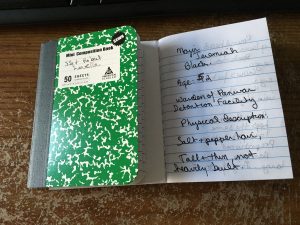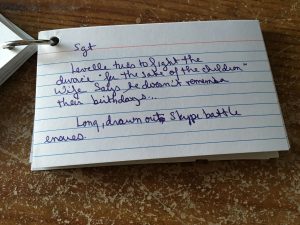So! Grimaulkin 2 is going along smashingly. 15K words so far with an average of 1000 words a day, except weekends which I can top 2K words a day.
I got my first one-star review from Homecoming. Basically, he said I had no plot. At first, I laughed it off. “You just don’t understand.” Then I thought about it, and I thought about the editing of War Mage, when the editor said, “All they’re doing is running around saying, ‘There’s dragons!'” I was so into being authentic that I didn’t develop a typical plot.
Now, I usually write toward a theme. Homecoming was “Home is where the heart is.” War Mage is “Friends are in surprising places.” Grimaulkin, I notice, doesn’t have a theme that I wrote toward, but it does have a plot (two of them, in fact). The stories in Water don’t have much of a theme or plot, because, well, it’s all sex.
Anyway, back to the one-star review and how I now think about War Mage. War Mage has no typical plot. Meaning protagonist vs. antagonist. Well, it does, but there’s garbage in between. The “oh look, there’s dragons” scenes. I could tell War Mage in a short story if I wanted to. But what is a novel if not a main plot with side plots along the way? Unless I’m looking at the construction wrong.
I’ve noticed, after reading some craft books, that novels are “protagonist in constant struggle.” Take a protagonist, throw in assorted things to block him, ratchet up the conflict as you go along, and have him succeed or fail. Thank you, Joseph Campbell.
So now, this is expected. Is this what makes a best selling story? Or is it something original? I will admit, I haven’t read a lot of fiction over the past couple of years, concentrating mostly on craft books because they’re easier to read/listen to in chunks. Fiction I have to keep the story in mind, and when I’m writing a story, I don’t want to have another story in my head to distract me. Maybe I should pick up a few short stories to get the idea of what people are looking for, and deconstruct those. Or break down a novel or two that I’ve already read.
I’m thinking Jim Butcher’s Harry Dresden series, which is what I’m basing Grim a lot on. To me, there’s a main plot with side plots. Repairman Jack has a main plot that goes through the entire novel with one or two side plots that continue through the books. One book I read two years ago had one plot throughout the entire thing, with assorted conflicts for the protagonist–the typical story that the craft books tell me to write. Until the author killed off a main character, I thought the story was boring. Then I threw it across the room in disgust, knowing that was just a ploy to make things exciting. Another story I read last year had a deus ex machina that pissed me the hell off. The last book I’m reading, which is gay erotic romance, has stalled out in the middle and I’ve put it aside not caring what happens to the main protagonist going home to his family (I expect that he’ll suddenly get a spine; I can see that coming a mile away).
What I’m going to do is let the editor take a look at War Mage. If it doesn’t have a plot, then I’ll think about what plot to put in and weave it through the story, with the authentic scenes in the middle. Grimaulkin, I feel confident in. Water, is, well, meh (except Scorpio–I’m proud of that one). I need to drag Grimaulkin 2’s plot a little longer than it is. I have a two-week time period to play with, and a lot can happen then.

